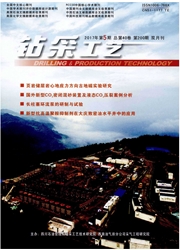

 中文摘要:
中文摘要:
Variation and degradation of P-110 casing steel mechanical properties, due to sulfide stress cracking (SSC) in sour environments, was investigated using tensile and impact tests. These tests were carried out on specimens, which were pretreated under the following conditions for 168 hours temperature, 60 °C; pressure, 10 MPa; H2S partial pressure, 1 MPa and CO2 partial pressure, 1 MPa; preload stress, 80% of the yield strength (σs); medium, simulated formation water. The reduction in tensile and impact strengths for P-110 casing specimens in corrosive environments were 28% and 54%, respectively. The surface morphology analysis indicated that surface damage and uniform plastic deformation occurred as a result of strain aging. Impact toughness of the casing decreased significantly and intergranular cracking occurred when specimens were maintained at a high stress level of 85% σs .
 英文摘要:
英文摘要:
Variation and degradation of P-110 casing steel mechanical properties, due to sulfide stress cracking (SSC) in sour environments, was investigated using tensile and impact tests. These tests were carried out on specimens, which were pretreated under the following conditions for 168 hours: temperature, 60 ℃; pressure, 10 MPa; H2S partial pressure, 1 MPa and CO2 partial pressure, 1 MPa; preload stress, 80% of the yield strength (os); medium, simulated formation water. The reduction in tensile and impact strengths for P-110 casing specimens in corrosive environments were 28% and 54%, respectively. The surface morphology analysis indicated that surface damage and uniform plastic deformation occurred as a result of strain aging. Impact toughness of the casing decreased significantly and intergranular cracking occurred when specimens were maintained at a high stress level of 85% %.
 同期刊论文项目
同期刊论文项目
 同项目期刊论文
同项目期刊论文
 期刊信息
期刊信息
